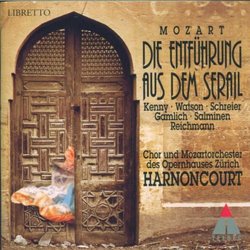| All Artists: Wolfgang Amadeus Mozart, Nikolaus Harnoncourt, Lillian Watson, Chor und Mozartorchester des Opernhaus Zürich, Peter Schreier, Wilfried Gamlich, Matti Salminen, Wolfgang Reichman, "Product Details" shows harnoncourt as composer, mozart as composer, etc. yvonne kenny as conductor Title: Mozart - Die Entführung aus dem Serail / Y. Kenny · L. Watson · P. Schreier · Gamlich · Salminen · Reichman · Zürich Opera · Harnoncourt Members Wishing: 0 Total Copies: 0 Label: Warner Music France Original Release Date: 1/1/2000 Re-Release Date: 5/18/1989 Album Type: Import Genre: Classical Styles: Opera & Classical Vocal, Historical Periods, Classical (c.1770-1830) Number of Discs: 2 SwapaCD Credits: 2 UPC: 022924264320 |
Search - Wolfgang Amadeus Mozart, Nikolaus Harnoncourt, Lillian Watson :: Mozart - Die Entführung aus dem Serail / Y. Kenny · L. Watson · P. Schreier · Gamlich · Salminen · Reichman · Zürich Opera · Harnoncourt
 | Wolfgang Amadeus Mozart, Nikolaus Harnoncourt, Lillian Watson Mozart - Die Entführung aus dem Serail / Y. Kenny · L. Watson · P. Schreier · Gamlich · Salminen · Reichman · Zürich Opera · Harnoncourt Genre: Classical
|
Larger Image |
CD Details |
CD ReviewsFinally ! die Entfurung treated seriously ! H. W. A. Leeuwen | Voorschoten, Netherlands | 01/10/2000 (5 out of 5 stars) "And it is an eye opener ! For starters, Harnoncourt costum built the turkish instruments that the score calls for, and that creates such a diversity in sound, that it is as though the dust and old varnisch has been lifted of an old stuffy painting to reveal the Rembrand underneath. Very precise, and extremely exciting is the way Harnoncourt chooses his tempi, justified by years of thorough musical research and a rich understanding of performance practice of the 18th century. Excellent soloists, particularly Matti Salminen sticks out. Extreme contrats in the characters also creates an extremely HUMAN story, what Mozart is all about in the end. If you play this stuff as background music, do NOT buy this disc." A Recording that is original, authentic, and enjoyable Timothy Kearney | Hull, MA United States | 07/17/2005 (5 out of 5 stars) "THE ABDUCTION FROM THE SERAGLIO (DIE ENTFUHRUNG AUS DEM SERAIL) was both a critical and popular success in Mozart's lifetime and while it is not revived as often as the three Da Ponte Operas (Marriage, Giovanni, and Cosi) or THE MAGIC FLUTE, it has never been completely out of the repertoire. Its overture is a popular work in symphonic concerts and a few of its arias find their way into the concert arena. In some respects the opera was revolutionary as is the case in so many Mozart works. The music has what is called a "Turkish" flair which was quite popular in Mozart's day. The Arabic world was seen as mysterious and exotic and anything Arabic was all the rage. Mozart does his best to give the music of the opera what was believed to be an authentic Arabic sound and used a wide variety of instruments to achieve this effect. It was also one of the first masterful scores for the German opera form known as singspiel where the arias are separated by spoken dialogue rather than musical recitative. The music worked for the stage, was loved by the audience, and sets a higher standard for music of the stage. Many times recordings from "period instruments" can sound strange to the modern ear because we are used to a fuller symphony orchestra than would have been the case in Mozart's day. Nikolaus Harnoncourt is able to use period instruments to make this recording sound as authentically Mozartarian (I'm not sure there is such a word but I'm using it anyway) and pleasing to the modern listener. The soloists do a great job, the spoken dialogue is not jarring as it can be in some recordings, and it is an overall appealing set. There are a number of good solid recordings of this work available. Two of the standards are the set under the direction of Ferenc Fricsay and another set directed by Sir Geog Solti. Both are highly praised and can provide an enjoyable listening experience, but if you are a Mozart buff, or want to hear a fresh recording of a great yet often neglected work, the Harnoncourt set is just for you. " Singspiel as it should be done danielinyaracuy | San Felipe, Yaracuy Venezuela | 07/10/2000 (5 out of 5 stars) "Certainly Harnoncourt is a controversial director. But what do we have here? A rather outdated story which in its own time was already particularly implausible. The comic effect would not even qualify for the laughing track of our modern sitcoms. Yet the music is just too good to dismiss it. Harnoncourt found the redemption key. A rather crisp tempo over all, a choice of bright and raw sonorities allows us not to dwell too much on the unlikely story. A few excellent singers, well directed, allow us to appreciate the wonderful pyrotechnics of the Mozart arias. The result? We do not force our laughter anymore and we leave with a wonderful sense of optimism. The all is well that ends well shines thorough the performance. What is even better, we leave this performance finally realizing that technically this was the first of the great Mozart operas, that some of the arias have nothing to envy the subsequent works. Then again Mozart fans knew this secret all along. It is the merit of this performance to show this to the newcomer. And to the critic of Harnoncourt to consider that perhaps he does have a valid point, that Mozart never intended this opera to be a mellifluous work, but a dynamic romp."
|

 Track Listings (22) - Disc #1
Track Listings (22) - Disc #1